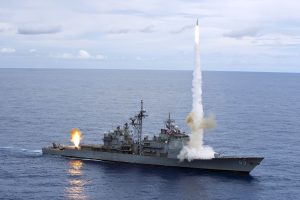NATO’s engagement in the Indo-Pacific has become a contentious and highly politicized issue, most notably with the mooted opening of a liaison office in Japan, which ignited a major international debate in the run-up to the Vilnius NATO summit in July 2023. There are six major myths about the alliance’s increasing engagement in the region. Irrespective of where one stands on the issue, getting the facts straight is important.
Myth 1: NATO’s troops are coming to the Indo-Pacific region
NATO as such is not prepared or willing to send troops to any Asian contingencies. There is no appetite for this in NATO countries. It would simply be impossible for the alliance to invoke the collective defense provision of Article 5 in response to any contingency over Taiwan, for example, because Taiwan is outside NATO’s jurisdiction. The focus of the partnership between NATO and the countries known as the “AP4” (or IP4) – Australia, Japan, New Zealand and South Korea – is practical cooperation in such areas as cybersecurity, standardization, maritime security, and humanitarian assistance.
Individual European countries, not least the United Kingdom and France, and increasingly Germany, have already been deepening their interaction and enhancing interoperability with Japan, Australia, and other U.S. allies and partners in the Indo-Pacific. But NATO itself will not bring troops to the region.
Myth 2: Countries in the Indo-Pacific region will join NATO
It is legally and politically impossible for Asian countries to join NATO. Article 10 of the North Atlantic Treaty says that the parties may invite countries in Europe to accede to the treaty. Moreover, and perhaps more fundamentally, no country in the Indo-Pacific region – and this includes Australia and Japan – is interested in joining the alliance. NATO’s “move to the East” is therefore in no way about expanding the collective defense arrangements to the Indo-Pacific.
Myth 3: NATO’s liaison office in Japan will affect the balance of power in the region and change the nature of NATO
NATO’s liaison office will never alter the balance of power in the Indo-Pacific region nor will it reshape the nature of the alliance as a Euro-Atlantic organization. What is being contemplated is simply a single-person office that is supposed to collect information and coordinate partnership activities with Japan and other partners in the region. It is meant to be an administrative innovation in the way in which NATO deals with those partners. The role that the proposed office could realistically play is therefore inherently limited. It is mainly Beijing that is hyping the significance of the plan. NATO already has a liaison office at the African Union headquarters in Addis Ababa, and no one seriously argues that NATO is no longer a Euro-Atlantic alliance.
Myth 4: NATO’s engagement in the Indo-Pacific will trigger an arms race in the region
NATO’s engagement in the region will not trigger an arms race in the region. Again, NATO’s engagement is not about sending troops or extending its collective defense guarantee to the region. More importantly, it is China that has been consistently and unilaterally increasing its arms over the past couple of decades. No country – not even the United States – has been able to match it, with the result that the regional balance of power has increasingly shifted in China’s favor.
Japan and other countries are slowly waking up to this reality and have been increasing their defense budgets in recent years. However, many experts believe that the speed of response is still not enough, prompting General Yoshida Yoshihide, Japan’s top uniformed officer, to warn, “We cannot maintain Japan’s security with our current capabilities.”
Myth 5: The United States is forcing Europe to follow its lead in the Indo-Pacific
It is wrong to believe that Europeans are only following the U.S. lead in their engagement in the Indo-Pacific region. That Europe does not have an option but to simply obey the United States is an image that Beijing would have others believe. It also reflects the highly hierarchical way in which China understands international relations. True, some Europeans may be using their engagement in the Indo-Pacific region, including alignment with the United States on China, as a way to improve relations with Washington. However, this is far from the whole story, and it cannot explain the main motive.
Myth 6: Europe does not have its own security interest in the Indo-Pacific
The biggest and obvious reason why the above holds has to do with the fact that Europe has its own set of interests in Asia. These interests are not only economic, but also increasingly encompass security and values, and are affected by what takes place in the Indo-Pacific. Europe does not want to, and nor should it, provoke China unnecessarily, but nor can it remain indifferent to the region. To protect its own interests, Europe at least needs to strengthen its early warning capabilities so that it is better prepared for contingencies in the Indo-Pacific that could have implications beyond the region. It is not in Europe’s interest to be seen as compromising on such a basic need out of fear of Beijing’s reaction.
Doubtless, some will remain skeptical about NATO’s engagement in the Indo-Pacific region. However, what is important is to avoid making arguments based on false stereotypes or unfounded myths. Both NATO and its partners in the Indo-Pacific seem realistic and discreet about what they can hope to achieve through their cooperation. Nonetheless, they are pursuing dialogue and cooperation, believing that doing so serves their respective interests in light of the growing links between the European and Indo-Pacific theaters.































